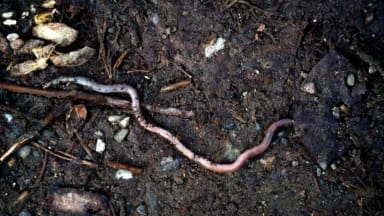
For Farmers Weekly, Emma Gillard writes that earthworms, which are so fundamental to the delivery of a range of soil ecosystem services such as nutrient cycling and water management, can increase crop yields by an average of 25% and total crop biomass by 21%. Comprehensive and quantitative data provided by researchers in the 2014 research paper ‘Earthworms increase plant production: a meta-analysis‘ by Jan Willem van Groenigen, Ingrid M. Lubbers, Hannah M. J. Vos, George G. Brown, Gerlinde B. De Deyn & Kees Jan van Groenigen.
According to the researchers the scale of their impact, depends on presence of crop residue, earthworm density and type and rate of fertilisation. The positive effects of earthworms become larger when more residue is returned to the soil, but disappear when soil nitrogen availability is high. This suggests that earthworms stimulate plant growth predominantly through releasing nitrogen locked away in residue and soil organic matter. The results therefore imply that earthworms are of crucial importance to decrease the yield gap of farmers who can’t -or won’t- use nitrogen. Where the soil was disturbed, the research experiments showed that earthworm effect on above-ground biomass was almost twice as high as that in undisturbed soils. An indication of earthworm ability in restoring demolished soil structure.
The Earthworm Society of Britain estimate that there are about 3,000 species of earthworms globally. According to the RHS, Britain has nearly 30 species of earthworm about 16 of these are likely to be found in gardens. They vary in size and colour, all help create good soil structure and fertility.
Sadly, the biodiversity crisis is affecting invertebrates. In 2022, a study by the British Trust for Ornithology (BTO), reported that the abundance of earthworms in soil has declined by a third. Changes in the countryside over the last century, pesticide use, repeated ploughing of fields and inorganic fertiliser application are likely to be the cause. The consequences of this trend are serious as earthworms are essential to soil health, ecosystem productivity and as van Groenigen’s research indicates levels of crop yields.
In addition, invertebrates are co-responsible for decomposing dead leaves, releasing nutrients and sequestering carbon in the soil, actions which contribute to maintaining fertility and providing protection against climate change.
Gardeners keen to encourage earthworms in their gardens to foster a more vibrant and thriving ecosystem should:
- Incorporate organic matter (compost, leaf mould, well-rotted manure) to provide a food source, encouraging their population growth
- Mulch to retain moisture and providing a protective environment. Adequate moisture management is key.
- Limit or better still, eliminate the use of chemical fertilisers, pesticides, and herbicides which can harm earthworms and other beneficial organisms in the soil
- Reduce digging and turning over the soil which can disrupt earthworms. No-dog gardening or shallow cultivation can be used instead to preserve earthworm ecosystems.
- Companion planting can create favourable conditions for earthworms such as planting legumes which fix nitrogen in the soil, benefiting both plants and earthworms alike.
As Charles Darwin said: “It may be doubted whether there are many other animals which have played so important a part in the history of the world, as have these lowly organised creatures.” High time, we look after them.

